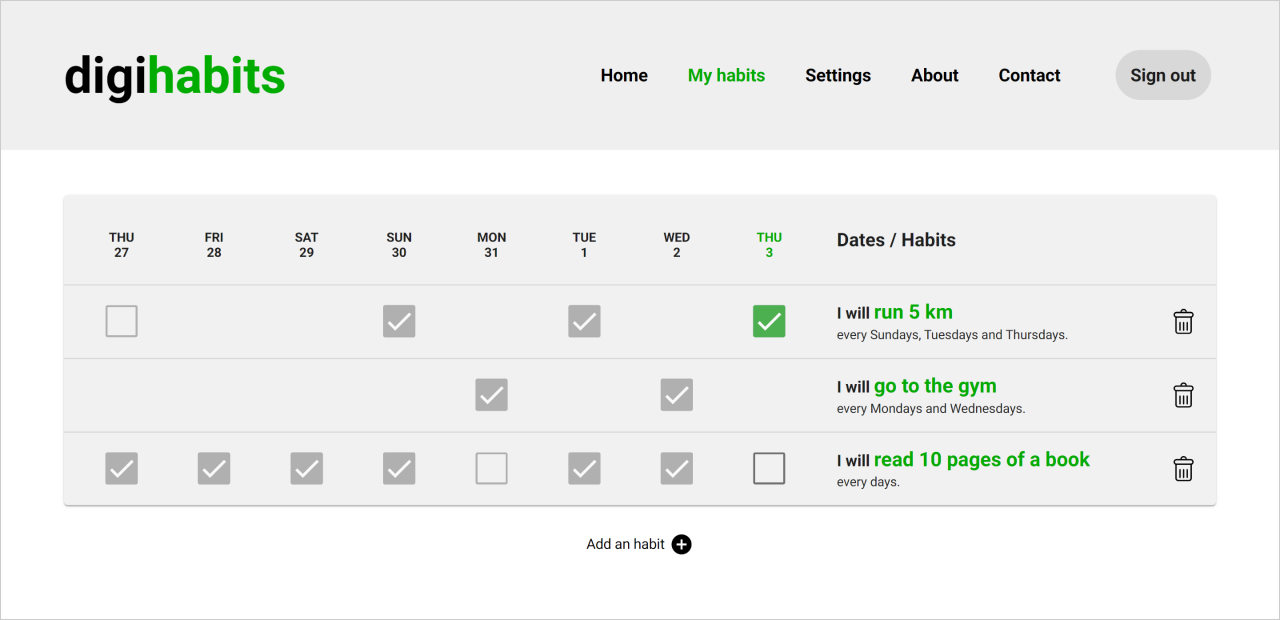✔️ digihabits 
A web app that helps users develop good habits by keeping them accountable.
Table of contents
☀ Introduction
The date was around January 2019. I was closing in on my college degree at Cégep de Victoriaville. The previous semester, I had a web development class where I got introduced to the MEAN stack (MongoDB, Express, Angular, NodeJS). I had a feeling that I did not fully grasp the material yet, so I wanted to create a side project to get more experience with those new javascript technologies that seemed so magical yet challenging at the same time.
As I was reading a lot of self-development books at that time. I thought that building a habits tracker could serve me well to keep me on track with my reading schedule.
📷 Preview
Habits page
The habits page displays the user's habits and past 8 days' entries. If a user completes a habit on a day he can log in and mark
Create habit page
The habit creation page allows a user to create a habit. He enters his habit description in the text field and selects the days he wants to complete that habit in the dropdown. There is a "Specify" option in case the user wants to select many different days throughout the week.
Landing page
The homepage is all about trying to convince the user that he should care about his daily habits and how this application might help him do so.
About page
The about page provides information about what got me interested in starting this project.
Contact page
It used to allow users to send me messages when the app was in production.
💿 Setup
Prerequisites
🚨 As I spent some setting back up this project on my machine in February 2022 to polish this README, I encountered a package incompatibility with NodeJS +16. Therefore, it is very important to use the aforementioned NodeJS version above. If you're on Windows, I suggest using nvm-windows by Corey Butler. On MAC or Linux, you can use the traditional NVM.
Installation steps
Run the following commands to install the project:
# Clone the project in a directory of your choice
$ git clone git@github.com:vcheeney/digihabits.git
# Move into the project directory
$ cd digihabits
# Create the .env file from the template
# You can edit the values if you wish but defaults will work fine.
$ cp .env.example .env
# Install the project dependencies
$ npm install
# Build the project
$ npm run buildUsage
In one terminal, start the database with the following command and leave the terminal running until you would like to shut the DB down.
# Start the database
$ docker-compose upIn another terminal, run the following command:
# Start the application
$ npm startAccess the Angular app at http://localhost:3000/
If you would prefer to run the development environment, run the two following commands in two different terminals:
# Run the development server
$ npm run server# Serve the Angular app in development mode
$ npm run devAccess the Angular app in development mode at http://localhost:4200/
🛠 Technologies Used
- MongoDB 3.6.3 - NoSQL database system
- Express 4.16.4 - NodeJS web framework
- Angular 7 - Frontend web framework
- NodeJS 10 - JavaScript Runtime
🚦 Project Status
I put this project on pause in April 2019 as my college internship was draining most of my coding energy...
I freshened it up a bit the following October as I was applying for my first university internship and wanted to get a more modern web dev position.
Once I got in and got introduced to React, I got absorbed in this new framework and wanted to move on to new ideas.

-lightgrey?style=for-the-badge)




